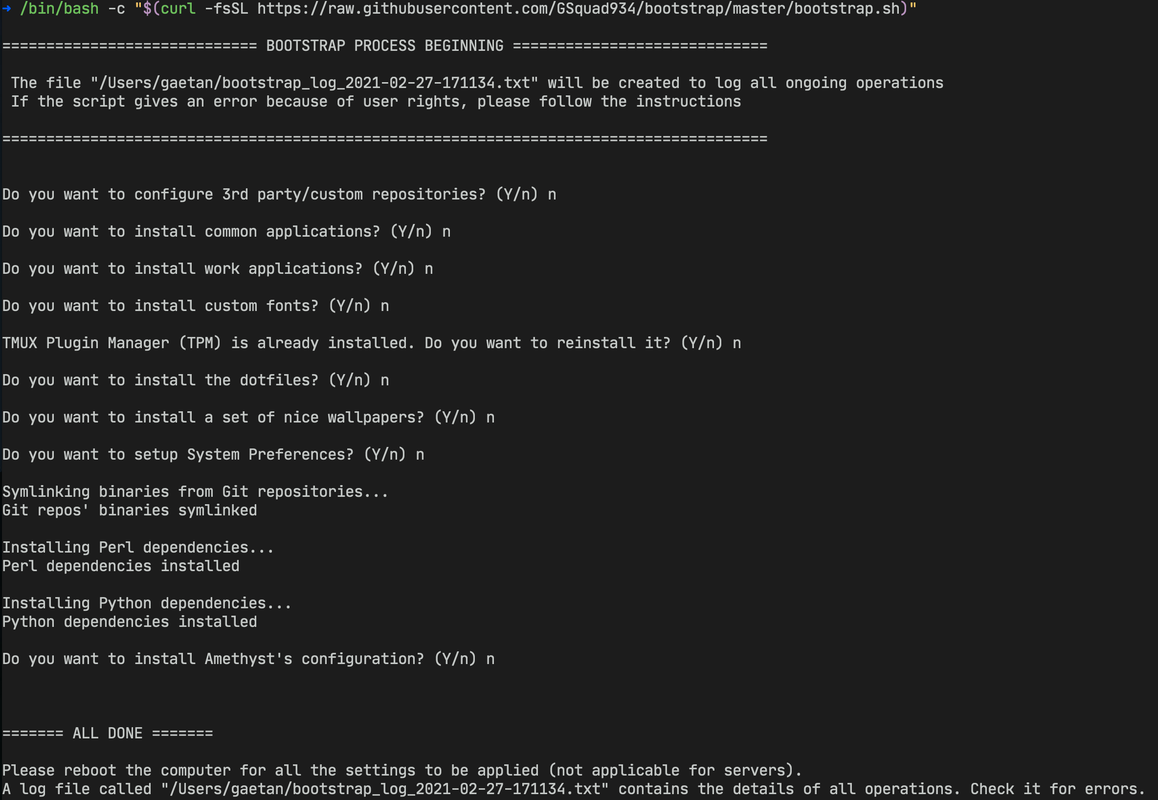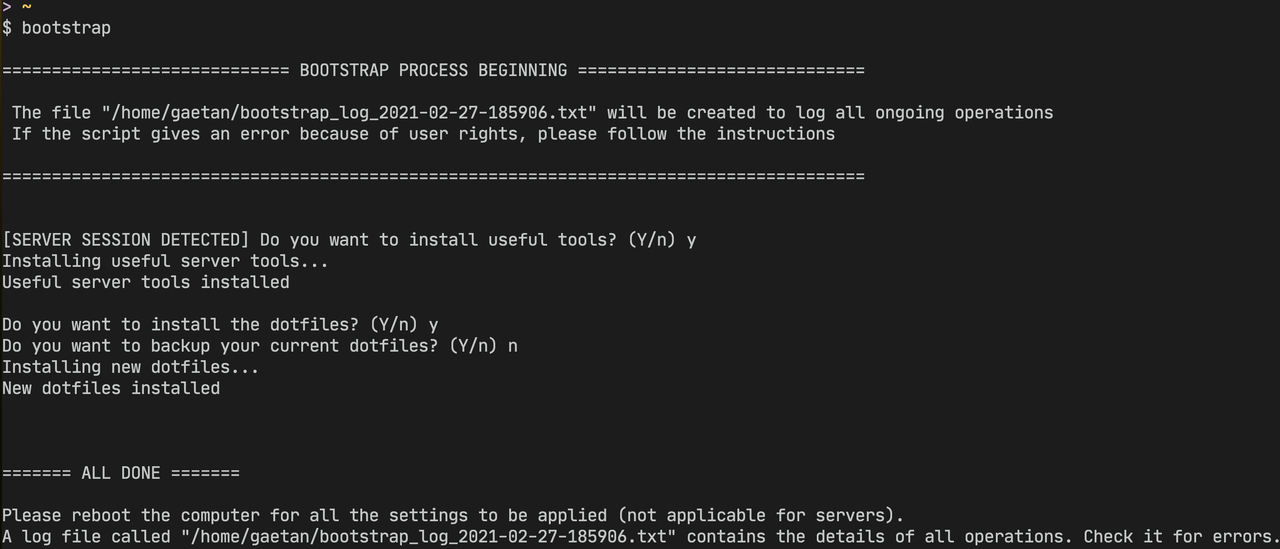This repository hosts a BASH bootstrap script that can be used to setup workstations and personal computers running on either Linux or macOS. The script has the following abilities:
- Modular usage: only desired operations can be performed (Ex.: only deploy dotfiles without installing any software)
- Setup 3rd party repositories to install software not available in the system default ones
- Automatically install TUI & GUI software
- Install professional software for a workstation
- Deploy 3rd party fonts commonly used such as JetBrainsMono, etc...
- Configure the prompt automatically (BASH & ZSH supported). The script will ask to set ZSH as the default shell too
- Install TMUX and necessary plugins
- Configure the system to personal preferences
- Detect the computer's video card and install the proper driver (open-source only)
- Detect a laptop and propose to install power management
- Detect a server connection (=SSH) and adjust the authorized operations
- Clean output to the console, but all operations are logged to a log file
- On a bare Arch Linux installation, deploy necessary packages for a GUI & (optional) deploy a GUI environment (WM & DE)
- When installing a GUI environment, offers the choice to login via Xinit (text mode) or with LightDM
- Deploy custom theme for CLI applications, but also proposes Gruvbox as an alternative
- Deploy custom GTK/QT theme for GUI applications
TLDR: there is nothing to manually install to use this script.
Whenever the script is ran, it performs a series of check to automatically install the necessary requirements:
- Detect the current operating system by reading the $OSTYPE environment variable
- If Linux is detected, it will detect if you run the script as root. If it is the case, it will ask you to create a new user and provide SUDO privilege (DOAS not yet supported). It will then ask to logout and run the script again as a regular user
- If macOS is detected, it will install Homebrew and also the XCode Command Line Tools if they are not already installed
- Detect the package manager used by the OS: this is necessary to properly install software. The most popular package managers are supported but it does not support any snaps, flatpacks or AppImages
Note: if Arch Linux (or derivative) is detected, the script will prompt to install the YAY AUR helper. This is optional, but recommended to deploy applications only available in the AUR.
This script has been fully validated with the following systems:
| OS | Compatibility | Comment |
|---|---|---|
| macOS 10/11/12 (Monterey) | ✅ | Fully compatible |
| Arch Linux & SystemD derivatives | ✅ | Fully compatible |
| Artix Linux & OpenRC/Runit/S6/66 derivatives | ✅ | Fully compatible |
| Debian (+ distros based on it) | ✅ | Fully compatible |
| Red Hat (+ distros based on it) | ✅ | Fully compatible |
| Void Linux | ✅ | Fully compatible |
| BSD | ❌ | Not compatible yet |
| Windows Subsystem for Linux (WSL) | ❗ | Graphical software won't install/work and dotfiles not behave as intended |
Depending on the packages availability in the repositories, some software may be missing and/or not be compatible. If your system is using OpenRC/Runit/S6/Suite66, some scripts may not be available for services. In that case, check the documentation.
The script supports the following package managers for now:
- APT (commands: apt-get and apt)
- DNF aka Dandified YUM & DNF (commands: dnf)
- Homebrew for macOS (command: brew)
- Pacman (command: pacman)
- Snap (command: snap)
- XBPS aka X Binary Package System (commands: xbps-install/query/etc...)
- YAY aka Yet Another Yogurt as the AUR helper (command: yay)
- YUM aka Yellowdog Update Modified & DNF (commands: yum)
The configuration has two parts: the list of applications needed to be installed and some variables to define (latter is optional).
The file apps.csv is very simple to use. It consists of a list of applications (one per line) and some tags in front of the application name. The following tags are available:
| Tag | Comment |
|---|---|
| S | Mark the application as a server application. If this is the only defined tag, the program will only be installed on remote servers |
| W | Mark the application as a work application (all other programs are considered as common) |
| X | Mark the application as a necessary package to install a GUI environment (Arch/Artix only) |
| Y | Mark the application as a necessary package to install a GUI environment (Void Linux only) |
| M | Application matching a S6 service script |
| N | Application matching a Suite66 service script |
| O | Application matching an OpenRC service script |
| P | Application matching a Runit service script |
| 0 | The application can be cloned from a Git repository |
| 1 | The application is binary directly downloaded from the Internet |
| 2 | The application can be installed with Homebrew on macOS and is a TUI program |
| 3 | The application can be installed with Homebrew on macOS and is a GUI program |
| 5 | The application can be installed with Pacman on Arch Linux & derivatives |
| 6 | The application can be installed with APT on Debian & derivatives |
| 7 | The application can be installed with YUM/DNF on Red Hat & derivatives |
| 8 | The application can be installed with YAY (AUR) on Arch Linux & derivatives |
| 9 | The application can be installed with XBPS on Void Linux |
The file is structured in this way because some applications have different names depending on the OS. Also, some applications are not available on some systems. Personally, I also use different applications on different systems depending on my workflow.
Note: the "0" tag will trigger the script to detect binaries in the cloned repositories and symlinked them in a location defined by the $gitrepoloc in their defined location (see chapter Variables below for details).
The file bootstrap.sh has a lot of variables defined at the very beginning. This allows changing the configuration of the script without actually modifying the code. It is recommended to change the following variables:
- applist: defines the URL of the apps.csv file
- dfloc: this variable defines where the installed dotfiles need to be stored. Default value is $HOME/.dotfiles
- dfrepo: this variable indicates what repository of dotfiles needs to be installed (this points to mydotfiles)
- scriptsloc: this variable defines where custom scripts will be stored. Personally, I use this to auto-create this folder so my dotfiles will deploy scripts there and add this folder to my $PATH. Default value is $HOME/.local/bin
- resourcesloc: this variable defines where resources to be used by custom scripts are located (Ex.: a list of all unicode characters)
- gitrepoloc: this variable defines where cloned Git repositories will be stored. Default value is $HOME/.sources/repos
- ddloc: this variable defines where downloaded binaries will be stored. Default value is /usr/local/bin
- sourcesloc: this variable defines where software sources will be stored. Default value is $HOME/.sources
- wallpapers: this variable indicates what repository of wallpapers can be downloaded
- wallpapersloc: this variable defines where downloaded wallpapers will be stored. Default value is $HOME/.local/share/wallpapers
Other variables define URLs for custom fonts, a plugin manager for TMUX, etc... They are self-explanatory and can also be customized.
Once everything is customized to your needs, execute the following command:
/bin/bash -c "$(curl -fsSL https://raw.githubusercontent.com/astsu777/bootstrap/master/bootstrap.sh)"
If curl is not installed, execute the following command that uses wget:
/bin/bash -c "$(wget -O - https://raw.githubusercontent.com/astsu777/bootstrap/master/bootstrap.sh)"
You can also clone this repository and execute the script locally (it will still download the apps.csv file using the $applist variable):
git clone --depth 1 https://github.com/astsu777/bootstrap.git
cd bootstrap
/bin/bash ./bootstrap.sh
If you use my dotfiles, a function called bootstrap will automatically call this script again.
When being executed, the script will try to determine if the machine is a laptop or not. If it is the case, the script will say so and propose to install tlp, a power saver software that can greatly increase a laptop's battery life.
If the script is ran via a SSH connection, it will consider it is running on a remote server and adapt its behavior. It will then only propose two operations:
- Install some useful server tools (tagged with "I" in the apps.csv file)
- Deploy dotfiles
My personal dotfiles are suited to run on both a workstation and server. The reason for this is the dynamism in them that does not disrupt the remote servers at all.
The output to the console is pretty empty in order to keep everything clean. However, a log file is always created in the $HOME folder and is unique for each run. This way, it is possible to review all performed operations and check for errors.
You can always reach out to me:
- Handle Python packages with "pip"
- Handle sources compilation in bulk

